Climate Connections is a collaboration between Grist and the Associated Press that explores how a changing climate is accelerating the spread of infectious diseases around the world, and how mitigation efforts demand a collective, global response. Read more here.
In 2016, hospitals in New York identified a rare and dangerous fungal infection never before found in the United States. Research laboratories quickly mobilized to review historical specimens and found the fungus, called Candida auris, had been present in the country since at least 2013.
In the years since the discovery, New York has become an epicenter for C. auris infections. Now, as the illness spreads across the U.S., a prominent theory for its sudden explosion has emerged: climate change.
As temperatures rise, fungi can develop tolerance for warmer environments — including the bodies of humans and other mammals, whose naturally high temperatures typically keep most fungal pathogens at bay. Over time, humans may... Read more
